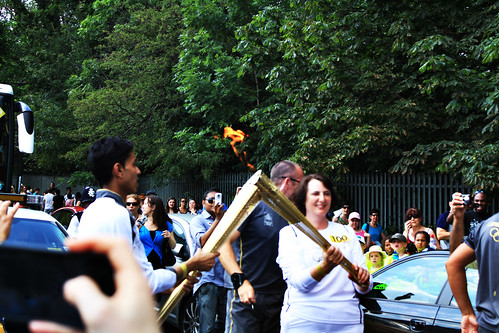The History of The Olympics
The Olympic motto is “Citius, Altius, Fortius”—“Faster, Higher, Stronger.” The Olympics is the biggest sporting competition in the world and its history is rich with many great details. The Olympic ‘Torch Relay’ has traveled hundreds of thousands of miles by countless people on different modes of transportation and continues to be the opening act for the Olympics. The Olympics also has a fun side with its silly categories which most people have never heard about.
The first recorded Olympic Games was in 776 B.C. and had a great foot race of about 200 yards held on a plain by the River Alpheus (now the Ruphia) just outside the little town of Olympia in Greece. It was from that day the Greeks began to keep their calendar by “Olympiads,” four-years between the celebrations of the famous games. The modern Olympic Games, which started in Athens in 1896, are the result of a French educator, Baron Pierre de Coubertin, “Because young people and athletics have gone together through the ages, education and athletics might go hand-in-hand toward a better international understanding.” The Olympic symbol is five interlocking circles colored blue, yellow, black, green, and red, on a white background, representing the five continents. At least one of those colors appears in the national flag of every country. The US flag is represented by two colors on the Olympic flag, red and blue.
The Olympic flame is a symbol of the Olympic Games. The fire was introduced at the 1928 Summer Olympics in Amsterdam, and it has been part of the modern Olympic Games ever since. In the ancient story, the Greek God Zeus, also known as ‘the thief of fire’, kept the fire burning throughout the celebration of the ancient Olympics. This symbol has turned into the ‘Torch Relay’ of modern times, which transports the flame from Greece to the place of the games. Over the last 80 years, the Olympic torch has been carried by hundreds of thousands of people and traveled on every imaginable form of transport. Continuing the historic tradition, the flame is still lit in Olympia, Greece, in the same way as it was in ancient times – with the aid of a parabolic mirror reflecting the sun’s rays. The flame went airborne for the first time on the Helsinki 1952 Torch Relay. What made the Sydney 2000 Torch Relay unique was the fact that it took place mostly at sea, with the torch being transported on water from one Pacific island or nation to the next on its way to Australia. The Olympic torch has even been underwater!
The Olympics is not always as its motto suggests of ‘Faster, Higher, Stronger’. There are some fun, more relaxed categories of sports. Some funny “sports ” in the Olympics are 1. Club Swinging; athlete stands holding clubs that are like bowling pins in each hand. He then twirls and whirls them around. The more complicated the routine, the more points he wins. 2. Pigeon Shooting; athletes aim to bring down as many pigeons as possible. 3. Tug Of War; teams that struggle and strain to pull a rope past a certain point. Great Britain has won the most medals in this event. 4. Roller Hockey; the game follows the rules of ice hockey, but with roller skates. 5. La Canne; ok, think fencing. Now take away the saber and replace it with a cane. You know, the walking stick type of thing? Then it’s La Canne. 6. Rope Climbing; just like in PE, climbers are timed to see how quickly they can shimmy up a braided rope. 7. Trampolining; which seems like an activity you do in your backyard, trampoline was an Olympic sport that started in 2000. Gymnasts performed on trampolines, somersaulting and flipping as stern-faced judges keep score. 8. Race Walking; competitors try to outrace one another without actually running. Even though it seems a little goofy, race walking has actually been an Olympic sport since 1904. To ensure that athletes do not run, race walkers must have one foot on the ground at all times or could be disqualification. Which is your favorite, funny sport?
The Olympics is a world wide tradition that has as long, rich history filled with traditions still carried on. One of these traditions is the Torch Relay, with the torch still being lit in Greece and then carried – by whatever means necessary – to its ultimate location. Don’t be fooled by the serious motto of “Citius, Altius, Fortius”, as the Olympics also has a lighter side. The silly categories may not be as well known as some of the other categories but are just as important. Next time it’s the year of the Olympics pick a silly sport to watch, enjoy and yell a new motto “Funny, Funnier, Funniest!”
https://www.olympic.org/ancient-olympic-games/history
https://www.infoplease.com/history-olympic-torch-flame-and-relay
http://dailyhive.com/vancouver/weird-olympic-sports-rio-2016

